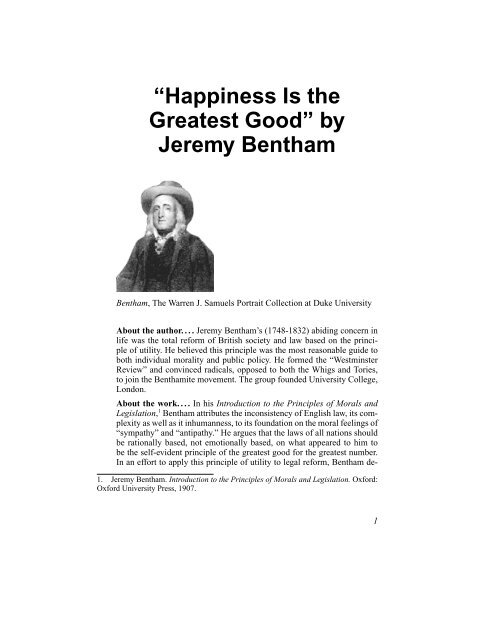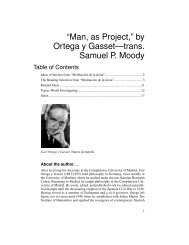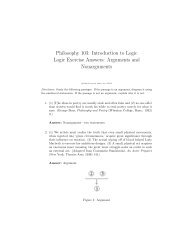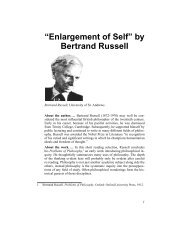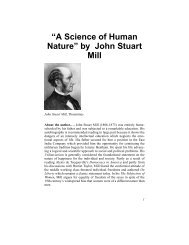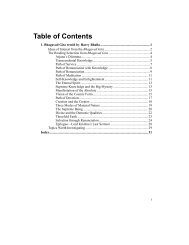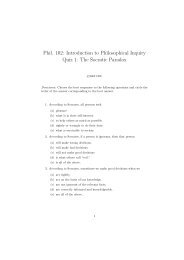“Happiness Is the Greatest Good” by Jeremy Bentham - Philosophy ...
“Happiness Is the Greatest Good” by Jeremy Bentham - Philosophy ...
“Happiness Is the Greatest Good” by Jeremy Bentham - Philosophy ...
Create successful ePaper yourself
Turn your PDF publications into a flip-book with our unique Google optimized e-Paper software.
<strong>“Happiness</strong> <strong>Is</strong> <strong>the</strong><br />
<strong>Greatest</strong> <strong>Good”</strong> <strong>by</strong><br />
<strong>Jeremy</strong> <strong>Bentham</strong><br />
<strong>Bentham</strong>, The Warren J. Samuels Portrait Collection at Duke University<br />
About <strong>the</strong> author. . . . <strong>Jeremy</strong> <strong>Bentham</strong>’s (1748-1832) abiding concern in<br />
life was <strong>the</strong> total reform of British society and law based on <strong>the</strong> principle<br />
of utility. He believed this principle was <strong>the</strong> most reasonable guide to<br />
both individual morality and public policy. He formed <strong>the</strong> “Westminster<br />
Review” and convinced radicals, opposed to both <strong>the</strong> Whigs and Tories,<br />
to join <strong>the</strong> <strong>Bentham</strong>ite movement. The group founded University College,<br />
London.<br />
About <strong>the</strong> work. . . . In his Introduction to <strong>the</strong> Principles of Morals and<br />
Legislation, 1 <strong>Bentham</strong> attributes <strong>the</strong> inconsistency of English law, its complexity<br />
as well as it inhumanness, to its foundation on <strong>the</strong> moral feelings of<br />
“sympathy” and “antipathy.” He argues that <strong>the</strong> laws of all nations should<br />
be rationally based, not emotionally based, on what appeared to him to<br />
be <strong>the</strong> self-evident principle of <strong>the</strong> greatest good for <strong>the</strong> greatest number.<br />
In an effort to apply this principle of utility to legal reform, <strong>Bentham</strong> de-<br />
1. <strong>Jeremy</strong> <strong>Bentham</strong>. Introduction to <strong>the</strong> Principles of Morals and Legislation. Oxford:<br />
Oxford University Press, 1907.<br />
1
<strong>“Happiness</strong> <strong>Is</strong> <strong>the</strong> <strong>Greatest</strong> <strong>Good”</strong> <strong>by</strong> <strong>Jeremy</strong> <strong>Bentham</strong><br />
velops <strong>the</strong> hedonistic, or as it is sometimes called, <strong>the</strong> felicific calculus.<br />
As an ethical teleologist, 2 <strong>Bentham</strong> devises a method of calculating <strong>the</strong><br />
most pleasure vis-á-vis <strong>the</strong> least pain <strong>by</strong> means of a quantitative scale.<br />
Historically, <strong>the</strong> hedonistic calculus was a major step in <strong>the</strong> development<br />
of rational decision <strong>the</strong>ory and utility <strong>the</strong>ory.<br />
From <strong>the</strong> reading. . .<br />
“An action <strong>the</strong>n may be said to be conformable to <strong>the</strong> principle of<br />
utility. . . when <strong>the</strong> tendency it has to augment <strong>the</strong> happiness of <strong>the</strong><br />
community is greater than any it has to diminish it.”<br />
Ideas of Interest from Morals and<br />
Legislation<br />
1. According to <strong>Bentham</strong>, what are <strong>the</strong> causes of human action? What is<br />
<strong>the</strong> principle of utility?<br />
2. Explain what <strong>Bentham</strong> means <strong>by</strong> <strong>the</strong> principle of asceticism. <strong>Is</strong> this<br />
principle related to <strong>the</strong> principle of sympathy and antipathy? Why<br />
does <strong>Bentham</strong> think that <strong>the</strong>se principles lead to inconsistent application<br />
and undue punishment?<br />
3. Can pleasure be quantified? Explain whe<strong>the</strong>r you think <strong>the</strong> use of <strong>the</strong><br />
hedonistic calculus for <strong>the</strong> individual and for society is feasible.<br />
4. What does <strong>Bentham</strong> mean when he explains that motives are nei<strong>the</strong>r<br />
bad nor good? Why doesn’t <strong>Bentham</strong> think that evil motives can be<br />
productive of over-all good? Explain his analysis of motives.<br />
2. I.e.,, <strong>Bentham</strong> believes our behavior is directed toward and shaped <strong>by</strong> <strong>the</strong> purpose<br />
of seeking pleasure.<br />
2 Reading For Philosophical Inquiry: A Brief Introduction
<strong>“Happiness</strong> <strong>Is</strong> <strong>the</strong> <strong>Greatest</strong> <strong>Good”</strong> <strong>by</strong> <strong>Jeremy</strong> <strong>Bentham</strong><br />
The Reading Selection from Morals<br />
and Legislation<br />
Of <strong>the</strong> Principle of Utility<br />
Chapter I—i. Nature has placed mankind under <strong>the</strong> governance of two<br />
sovereign masters, pain and pleasure. It is for <strong>the</strong>m alone to point out what<br />
we ought to do, as well as to determine what we shall do. On <strong>the</strong> one<br />
hand <strong>the</strong> standard of right and wrong, on <strong>the</strong> o<strong>the</strong>r <strong>the</strong> chain of causes and<br />
effects, are fastened to <strong>the</strong>ir throne. They govern us in all we do, in all we<br />
say, in all we think: every effort we can make to throw off our subjection,<br />
will serve but to demonstrate and confirm it. In words a man may pretend<br />
to abjure <strong>the</strong>ir empire: but in reality he will remain. subject to it all <strong>the</strong><br />
while. The principle of utility recognizes this subjection, and assumes it<br />
for <strong>the</strong> foundation of that system, <strong>the</strong> object of which is to rear <strong>the</strong> fabric<br />
of felicity <strong>by</strong> <strong>the</strong> hands of reason and of law. Systems which attempt to<br />
question it, deal in sounds instead of sense, in caprice instead of reason, in<br />
darkness instead of light.<br />
But enough of metaphor and declamation: it is not <strong>by</strong> such means that<br />
moral science is to be improved.<br />
Chapter I—ii.The principle of utility is <strong>the</strong> foundation of <strong>the</strong> present work:<br />
it will be proper <strong>the</strong>refore at <strong>the</strong> outset to give an explicit and determinate<br />
account of what is meant <strong>by</strong> it. By <strong>the</strong> principle of utility is meant that principle<br />
which approves or disapproves of every action whatsoever. according<br />
to <strong>the</strong> tendency it appears to have to augment or diminish <strong>the</strong> happiness<br />
of <strong>the</strong> party whose interest is in question: or, what is <strong>the</strong> same thing in<br />
o<strong>the</strong>r words to promote or to oppose that happiness. I say of every action<br />
whatsoever, and <strong>the</strong>refore not only of every action of a private individual,<br />
but of every measure of government.<br />
Chapter I—iii. By utility is meant that property in any object, where<strong>by</strong><br />
it tends to produce benefit, advantage, pleasure, good, or happiness, (all<br />
this in <strong>the</strong> present case comes to <strong>the</strong> same thing) or (what comes again<br />
to <strong>the</strong> same thing) to prevent <strong>the</strong> happening of mischief, pain, evil, or unhappiness<br />
to <strong>the</strong> party whose interest is considered: if that party be <strong>the</strong><br />
community in general, <strong>the</strong>n <strong>the</strong> happiness of <strong>the</strong> community: if a particular<br />
individual, <strong>the</strong>n <strong>the</strong> happiness of that individual.<br />
Reading For Philosophical Inquiry: A Brief Introduction 3
<strong>“Happiness</strong> <strong>Is</strong> <strong>the</strong> <strong>Greatest</strong> <strong>Good”</strong> <strong>by</strong> <strong>Jeremy</strong> <strong>Bentham</strong><br />
Chapter I—iv. The interest of <strong>the</strong> community is one of <strong>the</strong> most general<br />
expressions that can occur in <strong>the</strong> phraseology of morals: no wonder that<br />
<strong>the</strong> meaning of it is often lost. When it has a meaning, it is this. The community<br />
is a fictitious body, composed of <strong>the</strong> individual persons who are<br />
considered as constituting as it were its members. The interest of <strong>the</strong> community<br />
<strong>the</strong>n is, what is it?—<strong>the</strong> sum of <strong>the</strong> interests of <strong>the</strong> several members<br />
who compose it.<br />
Chapter I—v. It is in vain to talk of <strong>the</strong> interest of <strong>the</strong> community, without<br />
understanding what is <strong>the</strong> interest of <strong>the</strong> individual. A thing is said to promote<br />
<strong>the</strong> interest, or to be for <strong>the</strong> interest, of an individual, when it tends<br />
to add to <strong>the</strong> sum total of his pleasures: or, what comes to <strong>the</strong> same thing,<br />
to diminish <strong>the</strong> sum total of his pains.<br />
Chapter I—vi. An action <strong>the</strong>n may be said to be conformable to <strong>the</strong>n principle<br />
of utility, or, for shortness sake, to utility, (meaning with respect to<br />
<strong>the</strong> community at large) when <strong>the</strong> tendency it has to augment <strong>the</strong> happiness<br />
of <strong>the</strong> community is greater than any it has to diminish it.<br />
From <strong>the</strong> reading. . .<br />
“The principle of asceticism never was, nor ever can be, consistently<br />
pursued <strong>by</strong> any living creature. Let but one tenth part of <strong>the</strong> inhabitants<br />
of this earth pursue it consistently, and in a day’s time <strong>the</strong>y<br />
will have turned it into a hell.”<br />
Chapter I—vii. A measure of government (which is but a particular kind<br />
of action, performed <strong>by</strong> a particular person or persons) may be said to be<br />
conformable to or dictated <strong>by</strong> <strong>the</strong> principle of utility, when in like manner<br />
<strong>the</strong> tendency which it has to augment <strong>the</strong> happiness of <strong>the</strong> community is<br />
greater than any which it has to diminish it. . . .<br />
Chapter I—viii. Of an action that is conformable to <strong>the</strong> principle of utility<br />
one may always say ei<strong>the</strong>r that it is one that ought to be done, or at least<br />
that it is not one that ought not to be done. One may say also, that it is right<br />
it should be done; at least that it is not wrong it should be done: that it is<br />
a right action; at least that it is not a wrong action. When thus interpreted,<br />
<strong>the</strong> words ought, and right and wrong and o<strong>the</strong>rs of that stamp, have a<br />
meaning: when o<strong>the</strong>rwise, <strong>the</strong>y have none. . . .<br />
4 Reading For Philosophical Inquiry: A Brief Introduction
<strong>“Happiness</strong> <strong>Is</strong> <strong>the</strong> <strong>Greatest</strong> <strong>Good”</strong> <strong>by</strong> <strong>Jeremy</strong> <strong>Bentham</strong><br />
A Tea Resale Establishment near Lincoln’s Inn Fields, where <strong>Bentham</strong><br />
studied law after Oxford, Library of Congress<br />
Of Principles Adverse to that of Utility<br />
Chapter II—ii. A principle may be different from that of utility in two<br />
ways: I. By being constantly opposed to it: this is <strong>the</strong> case with a principle<br />
which may be termed <strong>the</strong> principle of asceticism. 2. By being sometimes<br />
opposed to it, and sometimes not, as it may happen: this is <strong>the</strong> case with<br />
ano<strong>the</strong>r, which may be termed <strong>the</strong> principle of sympathy and antipathy.<br />
Chapter II—iii. By <strong>the</strong> principle of asceticism I mean that principle, which,<br />
like <strong>the</strong> principle of utility, approves or disapproves of any action, according<br />
to <strong>the</strong> tendency which it appears to have to augment or diminish <strong>the</strong><br />
happiness of <strong>the</strong> party whose interest is in question; but in an inverse manner:<br />
approving of actions in as far as <strong>the</strong>y tend to diminish his happiness;<br />
disapproving of <strong>the</strong>m in as far as <strong>the</strong>y tend to augment it. . . .<br />
Chapter II—ix. The principle of asceticism seems originally to have been<br />
<strong>the</strong> reverie of certain hasty speculators, who having perceived, or fancied,<br />
that certain pleasures, when reaped in certain circumstances, have, at <strong>the</strong><br />
long run, been attended with pains more than equivalent to <strong>the</strong>m, took<br />
occasion to quarrel with every thing that offered itself under <strong>the</strong> name<br />
Reading For Philosophical Inquiry: A Brief Introduction 5
<strong>“Happiness</strong> <strong>Is</strong> <strong>the</strong> <strong>Greatest</strong> <strong>Good”</strong> <strong>by</strong> <strong>Jeremy</strong> <strong>Bentham</strong><br />
of pleasure. Having <strong>the</strong>n got thus far, and having forgot <strong>the</strong> point which<br />
<strong>the</strong>y set out from, <strong>the</strong>y pushed on, and went so much fur<strong>the</strong>r as to think it<br />
meritorious to fall in love with pain. Even this, we see, is at bottom but <strong>the</strong><br />
principle of utility misapplied.<br />
Chapter II—x. The principle of utility is capable of being consistently pursued;<br />
and it is but tautology to say, that <strong>the</strong> more consistently it is pursued,<br />
<strong>the</strong> better it must ever be for human-kind. The principle of asceticism never<br />
was, nor ever can be, consistently pursued <strong>by</strong> any living creature. Let but<br />
one tenth part of <strong>the</strong> inhabitants of this earth pursue it consistently, and in<br />
a day’s time <strong>the</strong>y will have turned it into a hell.<br />
Chapter II—xi. Among principles adverse to that of utility, that which at<br />
this day seems to have most influence in matters of government, is what<br />
may be called <strong>the</strong> principle of sympathy and antipathy. By <strong>the</strong> principle<br />
of sympathy and antipathy, I mean that principle which approves or disapproves<br />
of certain actions, not on account of <strong>the</strong>ir tending to augment<br />
<strong>the</strong> happiness, nor yet on account of <strong>the</strong>ir tending to diminish <strong>the</strong> happiness<br />
of <strong>the</strong> party whose interest is in question, but merely because a man<br />
finds himself disposed to approve or disapprove of <strong>the</strong>m: holding up that<br />
approbation or disapprobation as a sufficient reason for itself, and disclaiming<br />
<strong>the</strong> necessity of looking out for any extrinsic ground. Thus far<br />
in <strong>the</strong> general department of morals: and in <strong>the</strong> particular department of<br />
politics, measuring out <strong>the</strong> quantum (as well as determining <strong>the</strong> ground)<br />
of punishment, <strong>by</strong> <strong>the</strong> degree of <strong>the</strong> disapprobation.<br />
Chapter II—xii. It is manifest, that this is ra<strong>the</strong>r a principle in name than<br />
in reality: it is not a positive principle of itself, so much as a term employed<br />
to signify <strong>the</strong> negation of all principle. What one expects to find<br />
in a principle is something that points out some external consideration, as<br />
a means of warranting and guiding <strong>the</strong> internal sentiments of approbation<br />
and disapprobation: this expectation is but ill fulfilled <strong>by</strong> a proposition,<br />
which does nei<strong>the</strong>r more nor less than hold up each of those sentiments as<br />
a ground and standard for itself.<br />
Chapter II—xiii. In looking over <strong>the</strong> catalogue of human actions (says<br />
a partizan of this principle) in order to determine which of <strong>the</strong>m are to<br />
be marked with <strong>the</strong> seal of disapprobation, you need but to take counsel<br />
of your own feelings: whatever you find in yourself a propensity to condemn,<br />
is wrong for that very reason. For <strong>the</strong> same reason it is also meet<br />
for punishment: in what proportion it is adverse to utility, or whe<strong>the</strong>r it be<br />
adverse to utility at all, is a matter that makes no difference. In that same<br />
proportion also is it meet for punishment: if you hate much, punish much:<br />
if you hate little, punish little: punish as you hate. If you hate not at all,<br />
6 Reading For Philosophical Inquiry: A Brief Introduction
<strong>“Happiness</strong> <strong>Is</strong> <strong>the</strong> <strong>Greatest</strong> <strong>Good”</strong> <strong>by</strong> <strong>Jeremy</strong> <strong>Bentham</strong><br />
punish not at all: <strong>the</strong> fine feelings of <strong>the</strong> soul are not to be overborne and<br />
tyrannized <strong>by</strong> <strong>the</strong> harsh and rugged dictates of political utility.<br />
Chapter II—xiv. The various systems that have been formed concerning<br />
<strong>the</strong> standard of right may all be reduced to <strong>the</strong> principle of sympathy and<br />
antipathy. One account may serve to for all of <strong>the</strong>m. They consist all of<br />
<strong>the</strong>m in so many contrivances for avoiding <strong>the</strong> obligation of appealing to<br />
any external standard, and for prevailing upon <strong>the</strong> reader to accept of <strong>the</strong><br />
author’s sentiment or opinion as a reason for itself.<br />
Value of a Lot of Pleasure or Pain<br />
Chapter IV—i. Pleasures <strong>the</strong>n, and <strong>the</strong> avoidance of pains, are <strong>the</strong> ends<br />
that <strong>the</strong> legislator has in view; it behooves him <strong>the</strong>refore to understand<br />
<strong>the</strong>ir value. Pleasures and pains are <strong>the</strong> instruments he has to work with: it<br />
behooves him <strong>the</strong>refore to understand <strong>the</strong>ir force, which is again, in o<strong>the</strong>r<br />
words, <strong>the</strong>ir value.<br />
Chapter IV—ii. To a person considered <strong>by</strong> himself, <strong>the</strong> value of a pleasure<br />
or pain considered <strong>by</strong> itself, will be greater or less, according to <strong>the</strong> four<br />
following circumstances:<br />
1. Its intensity.<br />
2. Its duration.<br />
3. Its certainty or uncertainty.<br />
4. Its propinquity or remoteness.<br />
Chapter IV—iii. These are <strong>the</strong> circumstances which are to be considered<br />
in estimating a pleasure or a pain considered each of <strong>the</strong>m <strong>by</strong> itself. But<br />
when <strong>the</strong> value of any pleasure or pain is considered for <strong>the</strong> purpose of<br />
estimating <strong>the</strong> tendency of any act <strong>by</strong> which it is produced, <strong>the</strong>re are two<br />
o<strong>the</strong>r circumstances to be taken into <strong>the</strong> account; <strong>the</strong>se are,<br />
5. Its fecundity, or <strong>the</strong> chance it has of being followed <strong>by</strong> sensations of <strong>the</strong><br />
same kind: that is, pleasures, if it be a pleasure: pains, if it be a pain.<br />
6. Its purity, or <strong>the</strong> chance it has of not being followed <strong>by</strong> sensations of <strong>the</strong><br />
opposite kind: that is, pains, if it be a pleasure: pleasures, if it be a pain.<br />
These two last, however, are in strictness scarcely to be deemed properties<br />
of <strong>the</strong> pleasure or <strong>the</strong> pain itself; <strong>the</strong>y are not, <strong>the</strong>refore, in strictness to<br />
be taken into <strong>the</strong> account of <strong>the</strong> value of that pleasure or that pain. They<br />
Reading For Philosophical Inquiry: A Brief Introduction 7
<strong>“Happiness</strong> <strong>Is</strong> <strong>the</strong> <strong>Greatest</strong> <strong>Good”</strong> <strong>by</strong> <strong>Jeremy</strong> <strong>Bentham</strong><br />
are in strictness to be deemed properties only of <strong>the</strong> act, or o<strong>the</strong>r event, <strong>by</strong><br />
which such pleasure or pain has been produced; and accordingly are only<br />
to be taken into <strong>the</strong> account of <strong>the</strong> tendency of such act or such event.<br />
The Royal Gallery, House of Lords, London, England, Library of Congress<br />
Chapter IV—iv. To a number of persons, with reference to each of whom<br />
to <strong>the</strong> value of a pleasure or a pain is considered, it will be greater or less,<br />
according to seven circumstances: to wit, <strong>the</strong> six preceding ones; viz.<br />
1. Its intensity.<br />
2. Its duration.<br />
3. Its certainty or uncertainty.<br />
4. Its propinquity or remoteness.<br />
5. Its fecundity.<br />
6. Its purity.<br />
And one o<strong>the</strong>r; to wit:<br />
7. Its extent;<br />
that is, <strong>the</strong> number of persons to whom it extends; or (in o<strong>the</strong>r words) who<br />
are affected <strong>by</strong> it.<br />
Chapter IV—v. To take an exact account <strong>the</strong>n of <strong>the</strong> general tendency of<br />
any act, <strong>by</strong> which <strong>the</strong> interests of a community are affected, proceed as<br />
8 Reading For Philosophical Inquiry: A Brief Introduction
<strong>“Happiness</strong> <strong>Is</strong> <strong>the</strong> <strong>Greatest</strong> <strong>Good”</strong> <strong>by</strong> <strong>Jeremy</strong> <strong>Bentham</strong><br />
follows. Begin with any one person of those whose interests seem most<br />
immediately to be affected <strong>by</strong> it: and take an account,<br />
1. Of <strong>the</strong> value of each distinguishable pleasure which appears to be produced<br />
<strong>by</strong> it in <strong>the</strong> first instance.<br />
2. Of <strong>the</strong> value of each pain which appears to be produced <strong>by</strong> it in <strong>the</strong> first<br />
instance.<br />
3. Of <strong>the</strong> value of each pleasure which appears to be produced <strong>by</strong> it after<br />
<strong>the</strong> first. This constitutes <strong>the</strong> fecundity of <strong>the</strong> first pleasure and <strong>the</strong> impurity<br />
of <strong>the</strong> first pain.<br />
4. Of <strong>the</strong> value of each pain which appears to be produced <strong>by</strong> it after <strong>the</strong><br />
first. This constitutes <strong>the</strong> fecundity of <strong>the</strong> first pain, and <strong>the</strong> impurity of <strong>the</strong><br />
first pleasure.<br />
5. Sum up all <strong>the</strong> values of all <strong>the</strong> pleasures on <strong>the</strong> one side, and those<br />
of all <strong>the</strong> pains on <strong>the</strong> o<strong>the</strong>r. The balance, if it be on <strong>the</strong> side of pleasure,<br />
will give <strong>the</strong> good tendency of <strong>the</strong> act upon <strong>the</strong> whole, with respect to <strong>the</strong><br />
interests of that individual person; if on <strong>the</strong> side of pain, <strong>the</strong> bad tendency<br />
of it upon <strong>the</strong> whole.<br />
6. Take an account of <strong>the</strong> number of persons whose interests appear to<br />
be concerned; and repeat <strong>the</strong> above process with respect to each. Sum up<br />
<strong>the</strong> numbers expressive of <strong>the</strong> degrees of good tendency, which <strong>the</strong> act<br />
has, with respect to each individual, in regard to whom <strong>the</strong> tendency of it<br />
is good upon <strong>the</strong> whole: do this again with respect to each individual, in<br />
regard to whom <strong>the</strong> tendency of it is good upon <strong>the</strong> whole: do this again<br />
with respect to each individual, in regard to whom <strong>the</strong> tendency of it is<br />
bad upon <strong>the</strong> whole. Take <strong>the</strong> balance which if on <strong>the</strong> side of pleasure,<br />
will give <strong>the</strong> general good tendency of <strong>the</strong> act, with respect to <strong>the</strong> total<br />
number or community of individuals concerned; if on <strong>the</strong> side of pain,<strong>the</strong><br />
general evil tendency, with respect to <strong>the</strong> same community.<br />
Chapter IV—vi. It is not to be expected that this process should be strictly<br />
pursued previously to every moral judgment, or to every legislative or judicial<br />
operation. It may, however, be always kept in view: and as near as<br />
<strong>the</strong> process actually pursued on <strong>the</strong>se occasions approaches to it, so near<br />
will such process approach to <strong>the</strong> character of an exact one.<br />
Chapter IV—vii. The same process is alike applicable to pleasure and pain,<br />
in whatever shape <strong>the</strong>y appear: and <strong>by</strong> whatever denomination <strong>the</strong>y are<br />
distinguished: to pleasure, whe<strong>the</strong>r it be called good (which is properly<br />
<strong>the</strong> cause or instrument of pleasure) or profit (which is distant pleasure,<br />
or <strong>the</strong> cause or instrument of, distant pleasure,) or convenience, or advan-<br />
Reading For Philosophical Inquiry: A Brief Introduction 9
<strong>“Happiness</strong> <strong>Is</strong> <strong>the</strong> <strong>Greatest</strong> <strong>Good”</strong> <strong>by</strong> <strong>Jeremy</strong> <strong>Bentham</strong><br />
tage, benefit, emolument, happiness, and so forth: to pain, whe<strong>the</strong>r it be<br />
called evil, (which corresponds to good) or mischief, or inconvenience. or<br />
disadvantage, or loss, or unhappiness, and so forth. . . .<br />
Of Motives<br />
Chapter X—ix. No motives ei<strong>the</strong>r constantly good or constantly bad. In<br />
all this chain of motives, <strong>the</strong> principal or original link seems to be <strong>the</strong><br />
last internal motive in prospect: it is to this that all <strong>the</strong> o<strong>the</strong>r motives in<br />
prospect owe <strong>the</strong>ir materiality: and <strong>the</strong> immediately acting motive its existence.<br />
This motive in prospect, we see, is always some pleasure, or some<br />
pain; some pleasure, which <strong>the</strong> act in question is expected to be a means of<br />
continuing or producing: some pain which it is expected to be a means of<br />
discontinuing or preventing. A motive is substantially nothing more than<br />
pleasure or pain, operating in a certain manner.<br />
Chapter X—x. Now, pleasure is in itself a good: nay, even setting aside<br />
immunity from pain, <strong>the</strong> only good: pain is in itself an evil; and, indeed,<br />
without exception, <strong>the</strong> only evil; or else <strong>the</strong> words good and evil have no<br />
meaning. And this is alike true of every sort of pain, and of every sort of<br />
pleasure. It follows, <strong>the</strong>refore, immediately and incontestably, that <strong>the</strong>re is<br />
no such thing as any sort of motive that is in itself a bad one.<br />
General View and High Street, Oxford, England, Library of Congress<br />
10 Reading For Philosophical Inquiry: A Brief Introduction
<strong>“Happiness</strong> <strong>Is</strong> <strong>the</strong> <strong>Greatest</strong> <strong>Good”</strong> <strong>by</strong> <strong>Jeremy</strong> <strong>Bentham</strong><br />
Chapter X—xi. It is common, however, to speak of actions as proceeding<br />
from good or bad motives: in which case <strong>the</strong> motives meant are such as<br />
are internal. The expression is far from being an accurate one; and as it<br />
is apt to occur in <strong>the</strong> consideration of most every kind of offence, it will<br />
be requisite to settle <strong>the</strong> precise meaning of it, and observe how far it<br />
quadrates with <strong>the</strong> truth of things.<br />
Chapter X—xii. With respect to goodness and badness, as it is with very<br />
thing else that is not itself ei<strong>the</strong>r pain or pleasure, so is it with motives.<br />
If <strong>the</strong>y are good or bad, it is only on account of <strong>the</strong>ir effects: good, on<br />
account of <strong>the</strong>ir tendency to produce pleasure, or avert pain: bad, on account<br />
of <strong>the</strong>ir tendency to produce pain, or avert pleasure. Now <strong>the</strong> case<br />
is, that from one and <strong>the</strong> same motive, and from every kind of motive,<br />
may proceed actions that are good, o<strong>the</strong>rs that are bad, and o<strong>the</strong>rs that are<br />
indifferent. . . .<br />
Chapter X—xxix. It appears <strong>the</strong>n that <strong>the</strong>re is no such thing as any sort<br />
of motive which is a bad one in itself: nor, consequently, any such thing<br />
as a sort of motive, which in itself is exclusively a good one. And as to<br />
<strong>the</strong>ir effects, it appears too that <strong>the</strong>se are sometimes bad, at o<strong>the</strong>r times<br />
ei<strong>the</strong>r indifferent or good: and this appears to be <strong>the</strong> case with every sort<br />
of motive. If any sort of motive <strong>the</strong>n is ei<strong>the</strong>r good or bad on <strong>the</strong> score of its<br />
effects, this is <strong>the</strong> case only on individual occasions, and with individual<br />
motives; and this is <strong>the</strong> case with one sort of motive as well as with ano<strong>the</strong>r.<br />
If any sort of motive <strong>the</strong>n can, in consideration of its effects, be termed<br />
with any propriety a bad one, it can only be with reference to <strong>the</strong> balance<br />
of all <strong>the</strong> effects it may have had of both kinds within a given period, that<br />
is, of its most usual tendency.<br />
Chapter X—xxx. What <strong>the</strong>n? (it will be said) are not lust, cruelty, avarice,<br />
bad motives? <strong>Is</strong> <strong>the</strong>re so much as any one individual occasion, in which<br />
motives like <strong>the</strong>se can be o<strong>the</strong>rwise than bad? No, certainly: and yet <strong>the</strong><br />
proposition, that <strong>the</strong>re is no one sort of motive but what will on many<br />
occasions be a good one, is never<strong>the</strong>less true. The fact is, that <strong>the</strong>se are<br />
names which, if properly applied, are never applied but in <strong>the</strong> cases where<br />
<strong>the</strong> motives <strong>the</strong>y signify happen to be bad. The names of those motives,<br />
considered apart from <strong>the</strong>ir effects, are sexual desire, displeasure, and pecuniary<br />
interest. To sexual desire, when <strong>the</strong> effects of it are looked upon<br />
as bad, is given <strong>the</strong> name of lust. Now lust is always a bad motive. Why?<br />
Because if <strong>the</strong> case be such, that <strong>the</strong> effects of <strong>the</strong> motive are not bad, it<br />
does not go, or at least ought not to go, <strong>by</strong> <strong>the</strong> name of lust. The case is,<br />
<strong>the</strong>n, that when I say, “Lust is a bad motive,” it is a proposition that merely<br />
concerns <strong>the</strong> import of <strong>the</strong> word lust; and which would be false if trans-<br />
Reading For Philosophical Inquiry: A Brief Introduction 11
<strong>“Happiness</strong> <strong>Is</strong> <strong>the</strong> <strong>Greatest</strong> <strong>Good”</strong> <strong>by</strong> <strong>Jeremy</strong> <strong>Bentham</strong><br />
ferred to <strong>the</strong> o<strong>the</strong>r word used for <strong>the</strong> same motive, sexual desire. Hence<br />
we see <strong>the</strong> emptiness of all those rhapsodies of common-place morality,<br />
which consist in <strong>the</strong> taking of such names as lust, cruelty, and avarice, and<br />
branding <strong>the</strong>m with marks of reprobation: applied to <strong>the</strong> thing, <strong>the</strong>y are<br />
false; applied to <strong>the</strong> name, <strong>the</strong>y are true indeed, but nugatory. Would you<br />
do a real service to mankind, show <strong>the</strong>m <strong>the</strong> cases in which sexual desire<br />
merits <strong>the</strong> name of lust; displeasure, that of cruelty; and pecuniary interest,<br />
that of avarice.<br />
From <strong>the</strong> Principles of Morals and Legislation, ch. 13,<br />
“All punishment is mischief; all punishment is in itself is evil.”<br />
Related Ideas<br />
“Classical Utilitarianism Web” (http://www.la.utexas.edu/cuws/index.html).<br />
Writings and commentary on <strong>Bentham</strong>, Mill, and Sidgwick being developed<br />
<strong>by</strong> Dan Bonevac at <strong>the</strong> University of Texas.<br />
“Decision Sciences: How <strong>the</strong> Game <strong>Is</strong> Played” (http://www.nsf.gov/od/lpa/\<br />
news/publicat/nsf0050/decision/decision.htm). National Science Foundation.<br />
An introductory overview of utility and game <strong>the</strong>ory, including a discussion<br />
of its limitations.<br />
“<strong>Jeremy</strong> <strong>Bentham</strong> ” (http://www.utm.edu/research/ep/b/bentham.htm). Internet<br />
Encyclopedia of <strong>Philosophy</strong>. An excellent encyclopedic overview of<br />
<strong>Bentham</strong>’s life and thought.<br />
From <strong>the</strong> <strong>Bentham</strong>’s The Commonplace Book<br />
“The greatest happiness for <strong>the</strong> greatest number is <strong>the</strong> foundation of<br />
morals and legislation.”<br />
12 Reading For Philosophical Inquiry: A Brief Introduction
<strong>“Happiness</strong> <strong>Is</strong> <strong>the</strong> <strong>Greatest</strong> <strong>Good”</strong> <strong>by</strong> <strong>Jeremy</strong> <strong>Bentham</strong><br />
Houses of Parliament from <strong>the</strong> River, Library of Congress<br />
Topics Worth Investigating<br />
1. Utilitarianism is often cited as a consequentialist or teleological ethics.<br />
Consequentialism is <strong>the</strong> doctrine that <strong>the</strong> morally correct action is<br />
an action maximizing <strong>the</strong> good; hence, consequentialism is not so<br />
much concerned with <strong>the</strong> means used as it is concerned with probable<br />
outcomes, ends, or goals of activities. Utilitarianism holds only<br />
pleasure or happiness is an intrinsic good, whereas consequentialism<br />
implies that <strong>the</strong>re may well be o<strong>the</strong>r intrinsic goods, such as knowledge,<br />
that some persons might not desire. In any case, <strong>the</strong> question<br />
arises whe<strong>the</strong>r or not something instrumentally bad can lead to something<br />
intrinsically good. Do we actually judge <strong>the</strong> goodness of an action<br />
only <strong>by</strong> its consequences? Do <strong>the</strong> ends justify <strong>the</strong> means in some<br />
cases? Construct and analyze a few examples in support of your view.<br />
2. <strong>Bentham</strong> seems to equate happiness with pleasure. Are <strong>the</strong>re significant<br />
differences between pleasure and happiness? Do <strong>the</strong> characteris-<br />
Reading For Philosophical Inquiry: A Brief Introduction 13
<strong>“Happiness</strong> <strong>Is</strong> <strong>the</strong> <strong>Greatest</strong> <strong>Good”</strong> <strong>by</strong> <strong>Jeremy</strong> <strong>Bentham</strong><br />
tics of time, sensation, or emotion differ for each? Can one be happy<br />
while in painful circumstances? Provide some specific examples in<br />
support of some of <strong>the</strong> distinctions you notice.<br />
3. If pleasure for <strong>Bentham</strong> is intrinsically good, would anything count<br />
as being intrinsically bad? <strong>Bentham</strong> is often called a hedonist. Hedonism<br />
is <strong>the</strong> ethical view that pleasure alone is an intrinsic good<br />
for persons. Does <strong>Bentham</strong> believe <strong>the</strong> descriptive generalization that<br />
all persons in fact do seek pleasure (a view called psychological hedonism),<br />
or does he believe that all persons should or ought to seek<br />
pleasure, even though some persons might not (a view called ethical<br />
hedonism)? Relate your answer to <strong>Bentham</strong>’s <strong>the</strong>ory of motives.<br />
4. When <strong>Bentham</strong> explains <strong>the</strong> principle of utility in terms of <strong>the</strong> individual<br />
and in terms of <strong>the</strong> community, does he commit <strong>the</strong> fallacy<br />
of composition? 3 He writes above, Chapter I, V, “It is in vain to talk<br />
of <strong>the</strong> interest of <strong>the</strong> community, without understanding what is <strong>the</strong><br />
interest of <strong>the</strong> individual.”<br />
5. Vince Lombardi, <strong>the</strong> legendary football coach has said, “Show me a<br />
good loser, and I’ll show you a loser” and “Winning isn’t everything;<br />
it’s <strong>the</strong> only thing.” Compare <strong>the</strong>se statements to “As a man thinketh<br />
in his heart so is he.” 4 What would be <strong>Bentham</strong>’s reaction to <strong>the</strong> later<br />
statement? Has <strong>Bentham</strong> overlooked anything in asserting that motives<br />
are not an exception to his <strong>the</strong>ory?<br />
6. Attempt to do a detailed calculation of <strong>the</strong> total amount of pleasure<br />
and pain comparing sleeping-in with attending philosophy class. If<br />
you are sleeping, <strong>the</strong>n would it follow that you are experiencing nei<strong>the</strong>r<br />
pleasure nor pain because you are not conscious? In your calculation,<br />
be sure to include <strong>the</strong> extent of <strong>the</strong> pleasure you bring to <strong>the</strong><br />
o<strong>the</strong>r members of <strong>the</strong> class. If you have problems, try assigning pleasure<br />
as an ordinal relation ra<strong>the</strong>r than a cardinal relation, or check <strong>the</strong><br />
Internet to see if anyone else has attempted calculating some specific<br />
instances.<br />
3. The fallacy of composition involves <strong>the</strong> implication that a characteristic of a part<br />
of a something is attributable as <strong>the</strong> same characteristic of <strong>the</strong> whole. For example, <strong>the</strong><br />
inference, “ Since human beings are mortal, someday <strong>the</strong> human race must come to an<br />
end” is an instance of this fallacy. If all <strong>the</strong> players on an all-star team are excellent<br />
players, it would not logically follow that <strong>the</strong> team is an excellent team. In o<strong>the</strong>r words,<br />
in <strong>the</strong> fallacy of composition, <strong>the</strong> name of <strong>the</strong> characteristic in <strong>the</strong> predicate is used<br />
ambiguously.<br />
4. Proverbs, 23: 7.<br />
14 Reading For Philosophical Inquiry: A Brief Introduction
<strong>“Happiness</strong> <strong>Is</strong> <strong>the</strong> <strong>Greatest</strong> <strong>Good”</strong> <strong>by</strong> <strong>Jeremy</strong> <strong>Bentham</strong><br />
Index<br />
actions, 11<br />
(see also acts)<br />
acts, 7<br />
asceticism<br />
principle of, 5<br />
<strong>Bentham</strong>, <strong>Jeremy</strong>, 1<br />
consequentialism, 13<br />
fallacy<br />
composition, 14<br />
felicific calculus, 2<br />
(see also hedonism)<br />
good, 11<br />
<strong>Bentham</strong>, 9<br />
happiness, 3<br />
hedonism, 14<br />
calculus, 7<br />
hedonistic calculus, 2<br />
(see also hedonism)<br />
law, 1<br />
morals, 3<br />
motives, 10<br />
ought, 4<br />
pleasure, 7, 3<br />
(see also hedonism)<br />
punishment, 6<br />
rational decision <strong>the</strong>ory, 2<br />
right, 7<br />
social contract, 4<br />
social relations, 3<br />
<strong>Bentham</strong>, 8<br />
sympathy<br />
principle of, 6<br />
teleology<br />
ethics, 13<br />
Utilitarianism, 13<br />
utility<br />
principle of, 3, 5<br />
Reading For Philosophical Inquiry: A Brief Introduction 15


